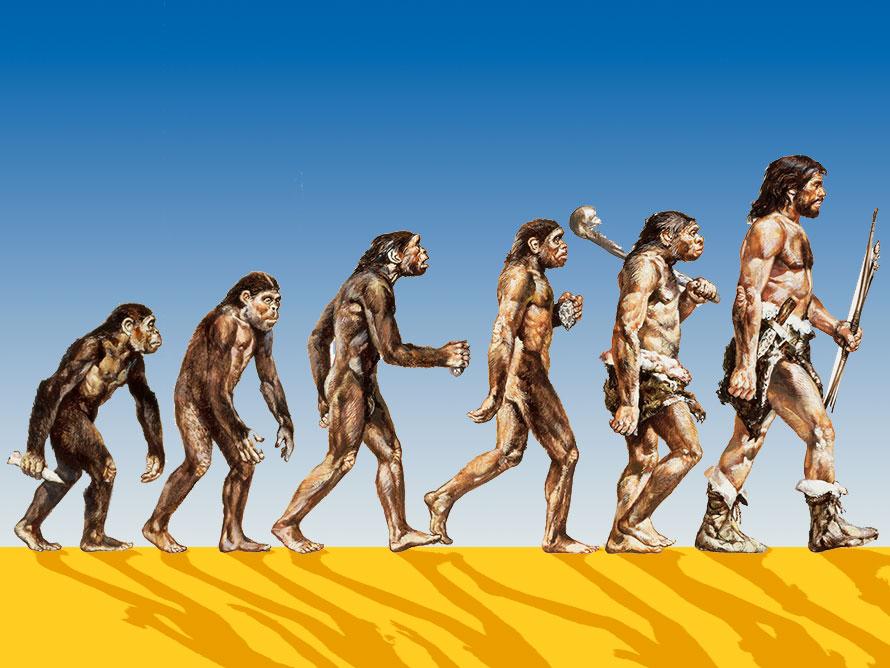Do we suffer from an evolution delusion? A top professor caused a stir yesterday by attacking the traditional theory that evolution represents progress. He wants the famous image abolished. The teenage girl opened the book with excitement. Her parents had bought each new volume in the Life Nature Library series since its launch four years earlier, in 1961. All of them had contained something that thrilled her, but this one was more fascinating still. Folding out across five pages was an illustration that vividly summed up human evolution: a sequence of 15 beautifully drawn figures. The title of the illustration was The Road to Homo Sapiens. The artist had started with a small, crouching, monkey-like figure called Pliopithecus thought to have existed 22 million years ago. Each successive figure was taller and more upright, with a head that looked more human, until the final one became recognisably a man, striding forward with a noble and intelligent look on his face. Sometimes known as The March of Progress, the sequence has become world-famous. It has also inspired many parodies: recent versions show the final figures sitting at a computer or sipping a cocktail. But its narrative has been generally accepted - until now. Speaking at this year's Cheltenham Science Festival, Dr Adam Rutherford declared that the image was fundamentally wrong, saying: "If I had one wish I would expunge it from the record of everything." Rutherford complains that the diagram "points to the idea that evolution has a direction... It suggests that there are ape-like ancestors and they begin to walk upright and eventually become us and it goes in a very nice, neat line." This, he argues, is not how evolution works. "We quite easily in the future could evolve into a completely different shape or go back to being quadrupedal." The key point, he adds, is that all creatures adapt to whatever environment they find themselves in: "It's a very human, hubristicOverly proud or self-confident. point of view, that we think of ourselves as the pinnacle of evolution." Moths are a classic case of adaptation. During the Industrial RevolutionA period of sudden, rapid industrialisation that transforms a country from an agricultural to an industrial economy., some of them developed darker colouring so that they could disguise themselves against buildings blackened by soot. Hippopotamuses are believed to have originally been land animals that lived in thick forests because their skin was very sensitive to sunlight. One theory is that they took to the water when the forests receded and left them vulnerable. Today, they live in rivers and lakes, but emerge onto land at dusk to forage. Horses were originally the size of dogs and had spread-out toes. Over time they developed longer legs and hooves so that they could outrun predators and cover greater distances. If Rutherford is right, future humans could be very different from us - particularly in the light of climate change. With sea levels rising, they might become amphibious. And as for the animal kingdom, it could again become dominated by dinosaurs. Do we suffer from an evolution delusion? Drawing conclusions Some say, yes. Dr Rutherford argues that the diagram should be much messier and "more like a network". Most scientists accept the theory of entropy, which says that the universe gradually moves from order to chaos; the idea that humans develop to become ever more efficient is contrary to that. Creatures can only thrive if they have stability - and the world is not a stable place. Others argue that evolution may not be as straightforward as the illustration suggests, but the principle still holds. We know that apes are more primitive forms of ourselves, and there is no suggestion that our ancestors had an advantage over us. It is even possible to see improvements in a single lifetime: the average height of a Japanese man has increased over the past 70 years from 5ft 3ins to 5ft 7ins. KeywordsHubristic - Overly proud or self-confident.
Do we suffer from an evolution delusion? A top professor caused a stir yesterday by attacking the traditional theory that evolution represents progress. He wants the famous image abolished.
Drawing conclusions
Keywords
Hubristic - Overly proud or self-confident.
Industrial Revolution - A period of sudden, rapid industrialisation that transforms a country from an agricultural to an industrial economy.
The scientist out to rewrite the human story

Glossary
Hubristic - Overly proud or self-confident.
Industrial Revolution - A period of sudden, rapid industrialisation that transforms a country from an agricultural to an industrial economy.
